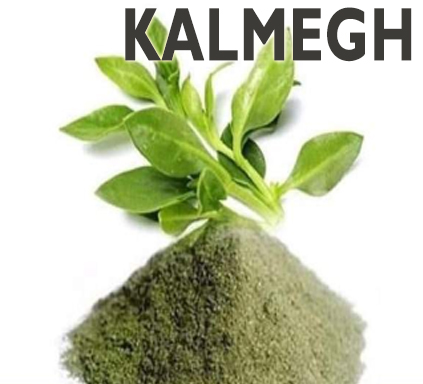
KALMEGH
Botanical name :- Andrographis paniculata Nees.
Family :- Acanthaceae
Common names :-
English :- Creat or Green Chirayta
Hindi :- Kalmegh
Sanskrit :- Bhunimb
Parts used :- Whole plant
Distribution:-
Kalmegh is a native of tropical South-East Asia and occurs throughout hotter parts of India.
It is widely distributed throughout plains of India from Uttar Pradesh to Assam, Madhya Pradesh, Tamil Nadu and Kerala
Active Components:-
Kalmegh contains bitter principles Andrographolide, a bicyclic Diterpenoid lactone and Kalmeghin (upto 2.5%)
Other categories of compounds that have also been isolated include Flavonoids (flavones), Noriridoides, Xanthones, Polyphenols and Trace elements (Cr, Mn, Co, Ni, Zn, Cu, Se, Rb, Sr, and Pb) and Macro-element (Potassium and Calcium) were identified and quantified in the roots.
Cinnamic acid, Caffeic acid, Ferulic acid and Chlorogenic acid were also isolated from the whole plant.
Uses :-
Anti-microbial activity –
Aqueous extract, Andrographolides and Arabinogalactan proteins isolated from the dried herb were screened for anti-microbial activity. The result showed that the aqueous extract and Arabinogalactan proteins have antibacterial activity against Bacillus subtilis (B. subtilis), Escherichia coli (E. coli), Pseudomonas aeruginosa while Andrographolide was only active against B. subtilis. All three were also reported to possess anti-fungal activity against Candida albicans.
Anti-inflammatory/Anti-allergic activity
The aqueous extract combined with the methanol extract of the leaves showed significant alleviation of lipopolysaccharide-induced release of pro-inflammatory mediators, inflammatory mediators & and allergic mediators. Seven phytochemicals, namely, Andrographolide, Neoandrographolide, Isoandrographolide, Andrograpanin, 7-O-Methylwogonin, 14-deoxy-11,12-didehydroandrographolide and Skullcapflavone isolated from A. paniculata leaves were screened for in vitro anti-inflammatory and anti-allergic potential
Anti-oxidant activity
Andrographolide contributes to antioxidant defenses. It acts directly by neutralizing free radicals. Also, it interferes indirectly by protecting mitochondrial integrity, inhibiting pro-oxidant enzymes, and activating antioxidant enzymes.
Immunostimulant activity
Andrographolide has been reported to significantly reduce the inflammation caused by histamine, dimethyl benzene, and adrenaline. The methanol extract of A. paniculata and andrographolide incubated with macrophages have been reported to inhibit LPS-stimulated NO production in a concentration-dependent manner
Hepatoprotective activity
The aqueous extract of Andrographis paniculata showed significant reduction in the liver tissue abnormalities and liver enzymes. It used extensively in the Indian traditional system of medicine as a Hepatoprotective and Hepatostimulative agent. The aqueous extract of leaf has been used for treatment of various liver disorders.


